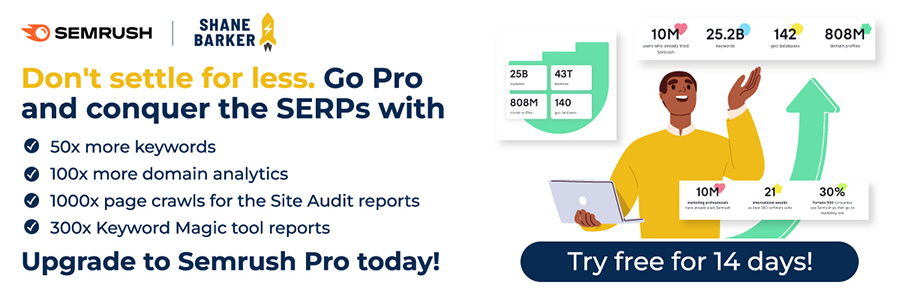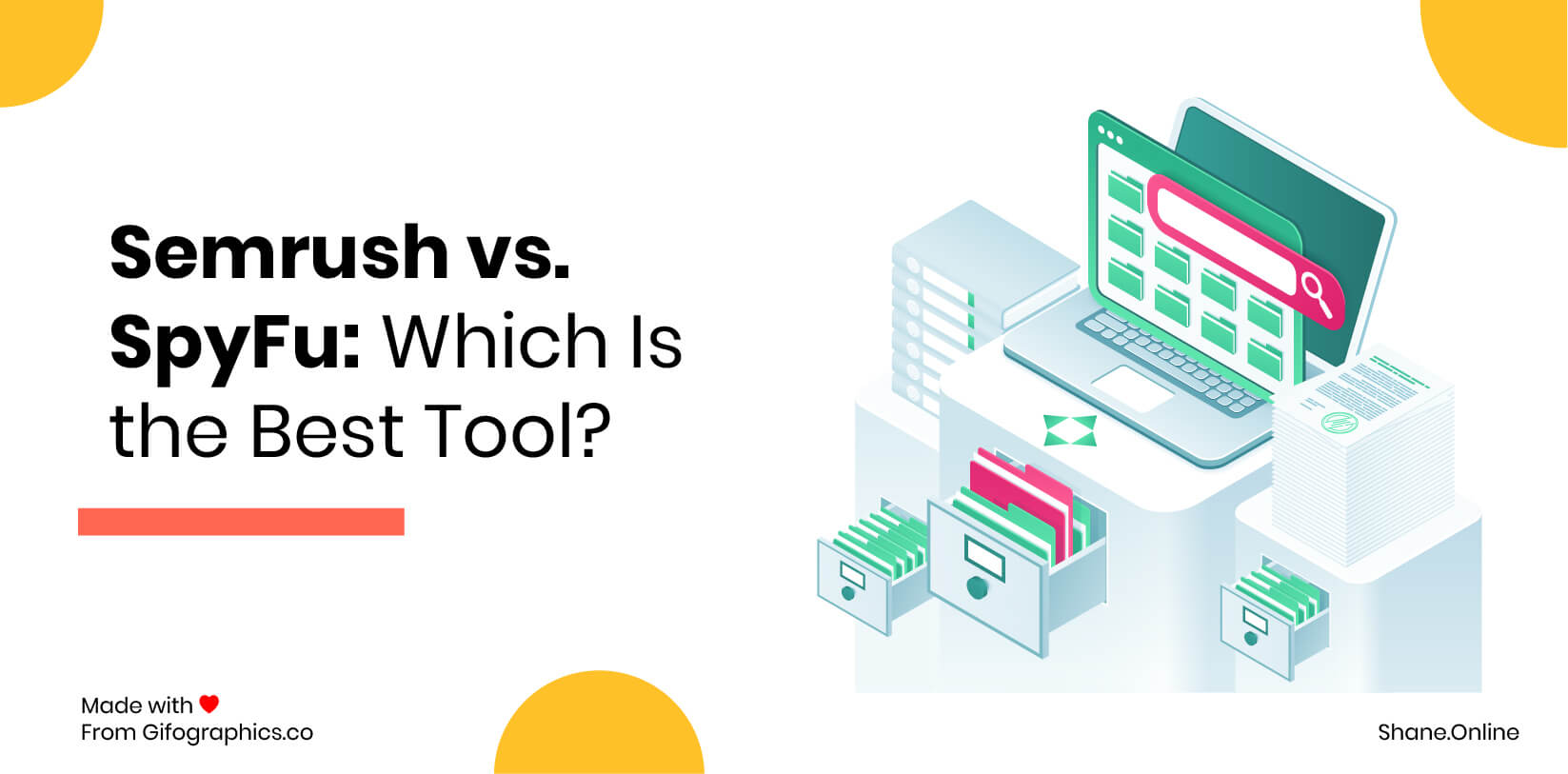As a digital marketer, you know that choosing the right tool can make all the difference in your strategy's success. When it comes to keyword research and competitive analysis, two tools stand out in the market – Semrush and Spyfu.
But which one is the best fit for your business?
In this article, I’ll compare Semrush vs. Spyfu and help you make an informed decision.
![semrush vs. spyfu: which is the best tool in [year]? 1 semrush vs. spyfu shane barker](https://shanebarker.com/wp-content/uploads/2023/03/semrush-vs-spyfu-shane-barker.jpg)
What is Semrush?
Semrush is a powerful SEO tool that offers in-depth analysis of websites and helps businesses with their search engine optimization efforts.
It provides detailed insights into competitor analysis, keyword research, backlinks, organic traffic, and more. With Semrush, companies can easily track their progress and make informed decisions to improve their online presence and drive more traffic to their website.
The user-friendly interface and customizable reports make it an ideal choice for small and large businesses alike.
Semrush Pros
- Has a limited, but useful, free version.
- Industry-leading SEO API.
- Offers other bonus tools such as PageImprove, and their own AI ImpactHero (content marketing platform).
- Straightforward pricing tiers.
- Local SEO – Provides you with a platform that is able to offer keywords that help boost your local SEO, as well as offers insights to your competitors in that area.
- Social Media Toolkit – This tool provides insights to your social media performance
- PageImprove – Allows you to improve on-page SEO from the Chrome browser.
Semrush Cons
- Some features of the platform can be harder to navigate, use, and understand.
- More difficult to learn than Similarweb.
- Customer support is only available to call on weekdays at indicated times. Otherwise, you’ll have to email support.
For an in-depth look at Semrush, check out my Semrush review.
What is SpyFu?
SpyFu is a powerful keyword research and competitive analysis tool that allows users to uncover their competitors' online marketing strategies, including their top organic and paid keywords, backlinks, and ad copy. It also provides insights into their search engine rankings, domain strength, and PPC budgets.
SpyFu Pros
- Comprehensive competitor analysis capabilities
- Easy-to-use interface with intuitive navigation
- Extensive keyword research and tracking tools
- Robust backlink analysis and domain tracking features
- Affordable pricing plans for businesses of all sizes
SpyFu Cons
- Limited data for smaller, niche websites
- Some features can be overwhelming for novice users
- Lacks social media monitoring and reporting capabilities
Semrush VS SpyFu Quick Comparison
Features | Semrush | SpyFu |
Supported search engines | Most Semrush tools work only with Google Analytics | SpyFu supports major search engines such as Google, Bing, Yahoo, and more |
Keyword database size | Semrush has over 21.1 billion keywords | SpyFu has a large keyword database with over 9 billion keywords |
Content marketing platform | Semrush has AI software called ImpactHero. | SpyFu does not have a content marketing platform |
Mobile rank tracking | Semrush tracks SERPs on mobile devices. | SpyFu supports mobile rank tracking |
Outbound link analysis | You can, but it is not a dedicated feature. | SpyFu provides outbound link analysis |
On-Page SEO checker | There is a dedicated on-page SEO checker | SpyFu has an On-Page SEO checker |
SEO content template | There is a dedicated SEO content template tool | SpyFu provides SEO content templates |
Website audit | Has an in-depth auditing tool available | SpyFu has a website audit feature |
Backlink audit | It has a backlink auditing tool | SpyFu offers backlink auditing |
Social Media Toolkit | Semrush offers a full-fledged social media toolkit | SpyFu does not have a Social Media Toolkit |
PPC Keyword Tool | Semrush has a PPC keyword tool | SpyFu provides a PPC Keyword Tool |
Local SEO | Semrush offers an excellent Local SEO platform that measures your SEO score against local competitors | SpyFu supports Local SEO |
Market/Trends Explorer | Semrush’s .Trends offers insights into the marketplace, with traffic analytics, including audience behavior and insights | SpyFu has a Market/Trends Explorer feature |
Free trial | Has a 14-day free trial | SpyFu offers a 7-day free trial |
Semrush VS Spyfu detailed Features Comparison
Let’s dive deep into the features of both Semrush and SpyFu to compare what both have to offer, and find which is truly the better platform.
Semrush vs. SpyFu – Keyword Research
Keyword research is Semrush’s forte. They boast the largest keyword database of all platforms and have one of the most comprehensive sets of tools to do keyword research with.
Inside Semrush’s keyword research toolkit, you’ll find the main features:
- Keyword Overview
- Keyword Magic Tool
- Keyword Manager
- Organic Traffic Insights
Spyfu has quite a few keyword research tools as well, although their database is half the size of Semrush’s.
- Keyword Overview
- Related Keywords
Keyword Overview
Both tools share a keyword overview tool, which offers a quick overview of a keyword, its analytics, and keyword variations.
Even if you have never used this keyword research feature before, it’s quite easy to figure out what to do.
There is a search bar in the middle of the screen. You just need to enter your keyword and choose a country from the drop-down menu on the right.
![semrush vs. spyfu: which is the best tool in [year]? 2 semrush keyword overview](https://shanebarker.com/wp-content/uploads/2021/08/semrush-keyword-overview.jpeg)
![semrush vs. spyfu: which is the best tool in [year]? 3 spyfu overview dashboard](https://shanebarker.com/wp-content/uploads/2023/03/spyfu-overview-dashboard.jpg)
Both tools offer the exact same data, offering keyword volume, similar keywords, estimated clicks, and CPC.
What is interesting is the discrepancy between the two results, which were done at the same time. The most likely reason is that Semrush makes use of its own proprietary web-crawler, as well as updates more regularly than SpyFu, which gives it the upper hand when it comes to accuracy.
Semrush’s Keyword Magic Tool/ SpyFu’s Related Keywords
If you are looking for new keyword ideas, Semrush’s Keyword Magic Tool should be your pick. It has more than 21 billion keywords.
![semrush vs. spyfu: which is the best tool in [year]? 4 semrush's keyword magic tool](https://shanebarker.com/wp-content/uploads/2023/03/semrushs-keyword-magic-tool.jpeg)
Once you enter your target keyword, you can sit back and relax. The keyword tool does all the work for you.
It also has multiple filters to narrow down your results. You can select any of the following options: phrase match, broad match, exact match, or related. You can also add advanced filters with this keyword tool.
![semrush vs. spyfu: which is the best tool in [year]? 5 semrush's keyword magic tool](https://shanebarker.com/wp-content/uploads/2023/03/semrushs-keyword-magic-tool-2.jpeg)
SpyFu has a similar feature called Related Keywords.
![semrush vs. spyfu: which is the best tool in [year]? 6 spyfu related keywords dashboard](https://shanebarker.com/wp-content/uploads/2023/03/spyfu-related-keywords-dashboard.jpg)
After doing a search on both, you’ll see similar results, except that Semrush did pick up a few more related keywords with high volumes that SpyFu had at a lower volume, such as “Burger King Menu”.
It offers a similar set of filters, and apart from accuracy, both tools are similar.
Semrush’s Keyword Manager/ Spyfu’s Bulk Analysis
Want to keep your keywords organized?
That’s where the Keyword Manager comes in. Using this keyword tool, you can list down relevant keywords under one roof.
What’s more, you can also export this list along with keyword metrics to other tools. You can export it as a CSV file or as XLSX.
Check out what the Keyword Manager looks like in the screenshot below:
![semrush vs. spyfu: which is the best tool in [year]? 7 semrush keyword manager](https://shanebarker.com/wp-content/uploads/2023/03/semrush-keyword-manager.jpg)
Spyfu doesn’t offer such a great tool like Semrush’s Keyword Manager, but they have a bulk upload tool, which allows you to create a large list of keywords (1000 keywords), which can be exported to other platforms, or Spyfu’s very own project manager.
![semrush vs. spyfu: which is the best tool in [year]? 8 spyfu's bulk upload](https://shanebarker.com/wp-content/uploads/2023/03/spyfus-bulk-upload.jpg)
Semrush’s Organic Traffic Insights
Semrush’s Organic Traffic Insights is a feature only Semrush offers, which enables you to get insights into your organic traffic (check out my case study). It combines all the data from Google Search Console, Google Analytics, as well as Semrush.
You can access it all under one roof with Semrush. The results can also help you ascertain if you are performing well in organic searches.
![semrush vs. spyfu: which is the best tool in [year]? 9 semrush organic traffic insights](https://shanebarker.com/wp-content/uploads/2023/03/semrush-organic-traffic-insights.jpg)
Overall Winner – Semrush
The main reason Semrush is better than Spyfu when it comes to keyword research is the accuracy of the data. With daily updates and a much larger database of keywords, and an awesome SEO Toolkit, Semrush takes the win.
Semrush vs. SpyFu – Rank Tracking
Rank tracking allows you to monitor your site’s rankings daily for some specific keywords. You can also set tracking for certain device types or locations.
Semrush’s Position Tracking/ Spyfu’s Ranking History
Both Semrush and Spyfu offer very similar rank tracking tools, which offer analytics of your website’s keywords and pages, how well they’re currently ranking, as well as ranking history.
![semrush vs. spyfu: which is the best tool in [year]? 10 semrush position tracking](https://shanebarker.com/wp-content/uploads/2023/03/semrush-position-tracking.jpg)
![semrush vs. spyfu: which is the best tool in [year]? 11 spyfu's ranking history](https://shanebarker.com/wp-content/uploads/2023/03/spyfus-ranking-history.jpg)
Both tools offer keyword position changes, but I appreciate that Semrush has a visibility, estimated traffic, and average position bar on the top-left side. Those statistics are great if you just want a quick overview of your performance.
SpyFu offers a nice graph that shows organic clicks, and a small little bar that offers average keyword position, but there’s no visibility score.
![semrush vs. spyfu: which is the best tool in [year]? 12 spyfu's ranking history filters](https://shanebarker.com/wp-content/uploads/2023/03/spyfus-ranking-history-filters.jpg)
I really like that there are plenty of filters and sorting options to change on SpyFu when looking at ranking positions, something that is much more limited on Semrush.
With that in mind, it is important to note that as you can see below, Semrush updates rankings frequently, with these rankings gathered only 3 hours ago.
![semrush vs. spyfu: which is the best tool in [year]? 13 semrush's update history](https://shanebarker.com/wp-content/uploads/2023/03/semrushs-update-history.jpg)
![semrush vs. spyfu: which is the best tool in [year]? 14 spyfu's update history](https://shanebarker.com/wp-content/uploads/2023/03/spyfus-update-history.jpg)
Overall Winner: Semrush
This was much closer than Keyword Research, but with more up-to-date rankings, Semrush takes the cake.
Semrush vs. SpyFu – Backlinking
Semrush’s tools for link building are advanced. They may take a while for you to understand, but they are incredibly rich with features.
For backlink analytics, here are the tools from Semrush that you should check out:
- Backlink Analytics
- Backlink Audit
- Backlink Gap
- Link Building Tool
- Bulk Analysis
SpyFu only has 3 backlinking tools, namely:
- Backlinks
- Backlink Outreach
- Keyword Backlinks
Semrush’s Backlink Analytics / SpyFu Backlinks
Backlink Analytics offers any referring domains, and anchor text, that links back to your website. In addition to this, you can also check your no-follow links, authority scores, follow links, and more.
Here’s what my site’s backlink profile looks like on Semrush:
![semrush vs. spyfu: which is the best tool in [year]? 15 semrush backlink check](https://shanebarker.com/wp-content/uploads/2023/03/semrush-backlink-check.jpeg)
And this is what it looks like on SpyFu.
![semrush vs. spyfu: which is the best tool in [year]? 16 spyfu backlinks dashboard](https://shanebarker.com/wp-content/uploads/2023/03/spyfu-backlinks-dashboard.jpg)
Semrush’s backlink analytics are far superior to SpyFu’s. SpyFu only offers backlinks to your website, whereas Semrush offers an incredibly in-depth analysis of backlinks.
It shows all websites linking back to you, your authority score, backlink types, authority scores of domains that are linking to you, and new/lost domains.
Semrush’s Backlink Audit
The Backlink Audit tool lets you assess your backlink profile. SpyFu does not have a backlink auditing tool.
Using this tool, you can check the quality of your backlinks and audit, remove, or disavow backlinks easily.
Semrush makes it easy to monitor your backlinks and offer toxicity scores for each, will helps you find and remove these backlinks.
![semrush vs. spyfu: which is the best tool in [year]? 17 semrush backlink audit](https://shanebarker.com/wp-content/uploads/2023/02/backlink-audit-tool-semrush.jpeg)
Semrush’s Backlink Gap/ SpyFu’s Keyword Backlink
Semrush’s Backlink Gap tool enables you to compare the backlink profiles of five sites at once.
All you need to do is enter the domain names of the websites. Based on that, Semrush lists all the referring domains that send links to them.
Using the filtering option in this tool, you can find websites that send links to your competitors but not your site. All in all, it becomes easy to identify gaps between your competitors’ strategies and yours.
![semrush vs. spyfu: which is the best tool in [year]? 18 semrush backlink gap](https://shanebarker.com/wp-content/uploads/2023/03/semrush-backlink-gap.jpg)
Spyfu’s Keyword Backlinks tool is fairly simplistic. You enter a keyword in, and it will offer domains that rank for that keyword and some basic info like monthly organic clicks and domain strength.
![semrush vs. spyfu: which is the best tool in [year]? 19 spyfu's backlinks 2](https://shanebarker.com/wp-content/uploads/2023/03/spyfus-backlinks-2.jpg)
Overall Winner: Semrush
When it comes to backlinking, Semrush is the clear winner. Not only does Semrush’s backlink analytics outperform SpyFu’s, but the backlink auditing tool is an outstanding tool to help gauge the value of domains linking back to you.
Semrush vs. SpyFu – PPC Advertising
Pay-per-click advertising is another way of gaining traffic, by paying for ads to be sponsored on websites and search engines like Google. Usually, this means your article will be placed above the other articles and will have the word “Ad” displayed.
![semrush vs. spyfu: which is the best tool in [year]? 20 ad campaign on google example](https://shanebarker.com/wp-content/uploads/2023/03/ad-campaign-on-google-example.jpg)
With a guaranteed top spot somewhere on the search page, it might seem that you don’t need to worry about SEO, but that’s not the case.
You’ll still need to do competitor research, use the correct keywords, and make sure your content is high-quality. Pretty much the same as trying to gain organic traffic.
The biggest difference is that you’re paying for that article to be where it is, now you need to make sure people actually click and read it.
To do this, you’ll need to be using the correct keywords for your ad, so that search engines display it to the correct audience. To do this, you’ll need a PPC keyword tool. Both Semrush and SpyFu have PPC keyword tools, and both work similarly.
These tools will help you find keywords that fit your niche, and that competitors might also be using. It looks similar to the normal keyword tool, but it’s also getting information from a connected Google Ads account.
![semrush vs. spyfu: which is the best tool in [year]? 21 semrush ppc keyword tool](https://shanebarker.com/wp-content/uploads/2023/03/semrush-ppc-keyword-tool.jpg)
![semrush vs. spyfu: which is the best tool in [year]? 22 spyfu's ppc keyword tool](https://shanebarker.com/wp-content/uploads/2023/03/spyfus-ppc-keyword-tool.jpg)
Both tools also have an ad history tool, which displays all previous ad history and performance, allowing you to see which ads worked, and which didn’t.
The main difference with SpyFu is that it separates ad history and Google Ad history, which is great if you’re running multiple campaigns but would like to single out your Google Ad campaigns through your connected Google Ads account.
![semrush vs. spyfu: which is the best tool in [year]? 23 spyfu's google ads tool](https://shanebarker.com/wp-content/uploads/2023/03/spyfus-google-ads-tool.jpg)
Overall winner: SpyFu
Considering that SpyFu is more programmed towards competitor analysis, Semrush simply can not keep up with it in this category.
Its dedicated toolbar to PPC research is packed with tools to help you research your competitor's PPC campaigns, track your PPC campaigns, find keywords for them, and create Google Ad campaigns using its Template creator. This is why SpyFu wins in this category.
Semrush vs. SpyFu – Competitor Research
SpyFu is designed to help you keep tabs on your competitor. So, obviously, they have many features centered around competitor analysis.
These include:
- SEO Competitor Analysis
- Ad Competitors
- Shared Organic Keywords (Kombat)
Semrush’s competitive research is divided between
- Domain overview
- Traffic analysis
- Organic Research
- Keyword Gap
- Backlink Gap
![semrush vs. spyfu: which is the best tool in [year]? 24 semrush competitor research](https://shanebarker.com/wp-content/uploads/2023/02/semrush-competitor-research.jpg)
SpyFu’s SEO competitor analysis feature enables you to get dirt on your competitors. You need to enter the domain name of the site whose competitors you want to check out.
For any site that you search for, you can check out the monthly value, monthly clicks, and SEO keywords.
![semrush vs. spyfu: which is the best tool in [year]? 25 spyfu seo competitor analysis](https://shanebarker.com/wp-content/uploads/2023/03/spyfu-seo-competitor-analysis.jpg)
The Domain Overview in Semrush offers a complete overview of a website's advertising performance, target audience, and more.
![semrush vs. spyfu: which is the best tool in [year]? 26 semrush domain overview](https://shanebarker.com/wp-content/uploads/2023/03/semrush-domain-overview.jpeg)
SpyFu’s PPC Research tools have a robust competitor analysis feature to track your competitors.
Using the tool, you can find your competitors’ PPC keywords, paid clicks, and ad budgets.
I wanted to check out the results for “ebay.com.”
Check out the results that I got from SpyFu in the screenshot below:
![semrush vs. spyfu: which is the best tool in [year]? 27 spyfu ad competitors](https://shanebarker.com/wp-content/uploads/2023/03/semrush-domain-overview.png)
Semrush’s Keyword Gap Tool / SpyFu’s Shared Organic Keywords
This three-way competitor research tool enables you to search for two competing domains to find effective keywords.
These “gap keywords” allow you to find keywords your competitor is losing ranks on, and allows you to focus and use them to outrank your competitor.
With this SpyFu tool, you can check the shared organic keywords as well as the ones that you may be lacking. It also highlights competitor keywords that you rank for but your contemporaries don’t.
All in all, it’s a spying tool that can give you an edge over your competitors.
![semrush vs. spyfu: which is the best tool in [year]? 28 spyfu shared organic keywords](https://shanebarker.com/wp-content/uploads/2023/03/spyfu-shared-organic-keywords.jpg)
Semrush’s Keyword Gap Tool looks very similar, and for the most part, operates similarly as well. Both tools offer a great deal of detail and are easy to use.
![semrush vs. spyfu: which is the best tool in [year]? 29 semrush keyword gap tool](https://shanebarker.com/wp-content/uploads/2023/03/semrush-keyword-gap-tool.jpg)
Overall winner: It’s a draw!
Honestly, I thought at first that SpyFu might win this category, but after going through both, and everything they have to offer, they're almost identical in structure and analysis.
Semrush vs. SpyFu – Pricing
Semrush pricing
Semrush has 3 pricing tiers:
- Pro Plan: $129.95/month
- Guru Plan: $249.95/month
- Business Plan: $499.95/month
Semrush offers three balanced tiers, with their lowest package great for small businesses, and their business plan an excellent option for large agencies and organizations.
They also offer extra features for an additional price:
- ImpactHero: $200/month
- Semrush .Local: $20/month for the basic plan and $40/month for the premium plan
- Semrush .Trends: $200/month
- Agency Growth Kit: $150/month
SpyFu’s Pricing Compared to Semrush
SpyFu acknowledges that Semrush is a direct competitor, and has even priced themselves accordingly, making direct comparisons to their packages versus Semrush’s.
Here’s how SpyFu measures up to Semrush in pricing:
SEMRUSH
Pro Plan
$129.95 / month
Guru Plan
$249.95 / month
Business Plan
$499.95 / month
SPYFU
Basic Plan
$39 / month
Professional Plan
$79 / month
Team Plan
$299 / month
Overall Winner: SpyFu
It was a tough battle, and both platforms drew blood, but SpyFu’s dedication to undercut one of their biggest competitors needs to be rewarded.
In each instance, they’ve taken a similar package structure to Semrush, but halved the price, and doubled the resources, which makes it an easy win for SpyFu.
Which Tool Should You Choose?
It’s a close battle regarding Semrush and Spyfu, but to be honest, both have a place in the market, and although there’s some overlap, there will be times when one tool is more necessary than the other.
When Should You Choose Semrush
Semrush is marketed as an all-in-one tool, and that’s exactly what it is. There’s an emphasis on SEO, and it’s by far the best part of Semrush, but it remains a jack of all trades, never really specializing in one or the other.
That’s what makes it the perfect tool for beginners and small businesses. It’s a bit more expensive than SpyFu, but owning Semrush means you won’t need many other tools. You have a tool that’s able to analyze your website’s technical, off-page, and on-page SEO, as well as provide statistics and competitor analysis.
If you’re not ready to settle on Semrush or SpyFu yet, don’t worry. Here are more Semrush alternatives for you to choose from.
When Should You Choose SpyFu
SpyFu has SEO features, and they aren’t that bad, but it still lacks behind Semrush. It has less than half the keyword database as Semrush, and the backlink analytics aren’t as in-depth as Semrush’s.
Where it makes up for it is in competitor analysis, and especially its PPC analytics. If you’re focused on pay-per-click campaigns, then its analytics and offerings regarding ad campaigns are up there with the best.
If SpyFu isn’t doing it for you, but you’d like more comparisons to Semrush, check out:
FAQs
Q1. Is there a free version of Semrush?
A. Yes there is a free, but limited version. However, this comes with a caveat. You only get 10 free reports per day. So, if you need more reports, you’ll need to purchase the paid version.
Given the amount of information you can derive from the tool, it’s safe to say that you’ll soon need more than 10 reports daily.
To take a test drive of its premium features, you can opt for the 14-day free trial.
Q2. Is Semrush a good SEO tool for beginners?
A. Yes.
Semrush is an extremely user-friendly tool that makes the entire process of SEO simple and uncomplicated. While there is, of course, a slight learning curve due to its numerous features, you’ll soon be able to have a grasp of everything.
The best part about this tool is that all its features are simplified yet provide in-depth information that can help you dive deep into analytics.
Q3. If I opt for the free trial, will my card be charged?
A. While Semrush does ask for your credit card information when you’re opting for the free trial, your card won’t be charged. It’ll only be charged when your free trial is over.
The end date of the free trial, too, is mentioned when you’re providing your card details.
Q4. Is competitive intelligence included in all the plans offered by Semrush?
A. No, being a unique tool, competitive intelligence is provided as an add-on by Semrush. Regardless of your plan, the competitive intelligence will cost an added $200/month.
It gives you detailed information about any and every website on the internet, and you can see their traffic analytics, top-ranking pages, and more.
Additionally, you’ll be able to get an in-depth look into your market, its leaders, audience, market share, and more.
Q5. Do you get a refund if you cancel your subscription?
A. Yes, Semrush is pretty customer-friendly and if you cancel your subscription on time, they’ll refund your net price without any trouble.
Their only requirement is that the cancellation request must be made within seven days of your billing date.
What’s more?
If you were charged because you forgot to cancel your subscription at the end of your free trial, they’ll refund that as well. Just like the other case, the only step that you need to take is to send a refund request within seven days from the date of your billing.
Q6. Does Semrush provide customer support?
A. Semrush provides customer support online and by telephone. However, there’s no option for live support. You can reach out to them by filling out the online form or email them as well.
However, if you require immediate support, you can reach out to one of their call centers located around the world. But you can call them only from Monday to Friday.
Q7. Why can’t you see any results on SpyFu for a specific domain?
A. New domains may not yield any results on SpyFu. That’s because SpyFu checks out websites based on their keywords.
If a domain isn’t ranking organically and not even buying ads, it’s not possible for the tool to know that it exists.
However, once a website does rank for a keyword, it stays in SpyFu’s database.
What if you are ranking for keywords, but your domain still does not show up?
In such a case, it’s likely that your keywords have still not been added to SpyFu’s keyword data registry.
There is also another case scenario possible here.
You know that you are ranking for a keyword that is added to SpyFu’s database. Yet, you can’t see any results on SpyFu.
It’s likely that a particular site is showing up on localized searches only.
For instance, if you are putting out an ad in Minnesota and you rank on a keyword that is in SpyFu’s database, you are likely to see results that show up exclusively in your local IPs.
Keep in mind that SpyFu is designed to take data from Google from the most neutral place., so localized results do not affect their data.

















Good read
Hi Mike, thank you so much! 🙂
Thanks for sharing the comparison.
I was just wondering for the SEMrush competitor is only Ahref, today I came to know that Spyfu is also there.
Hi Shiva, the pleasure is all mine. I’m excited to know that you liked reading my post about Semrush vs. SpyFu.